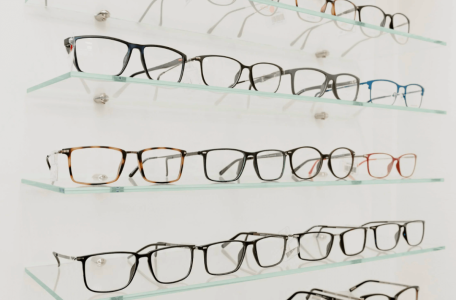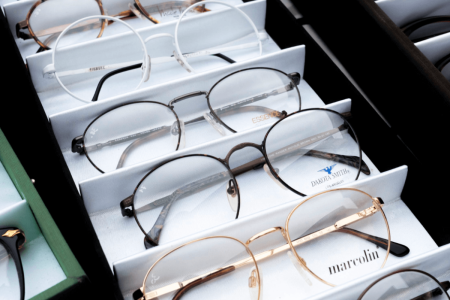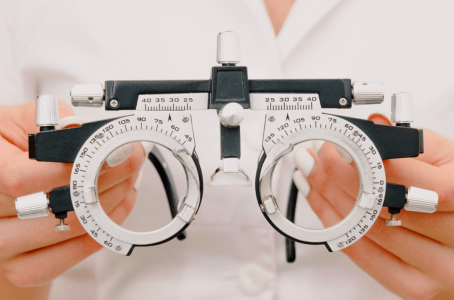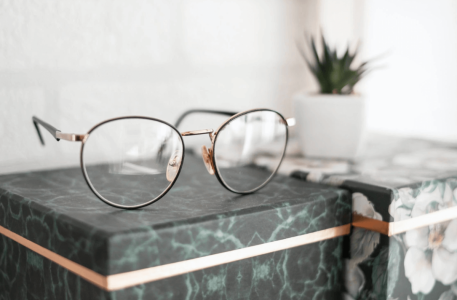Eye-Opening Tips To Help You Find The Perfect Pair Of Eyeglasses
- Replies 5
From fuzzy vision to age-related problems, there can be many reasons why our eyes need a helping hand. Thankfully, there’s an easy solution: glasses!
But with such a plethora of different styles, materials, and lenses to choose from, it's enough to give anyone a headache.
That’s why we want to share some tips from experts on how you can buy the perfect new pair of glasses - without any added confusion. So if you’re ready to see the world a lot more clearly, read on for advice to make your purchase an informed one.
Select The Right Lenses
When it comes to lenses, there's a variety of different types to choose from. The most common one is a single-vision lens, which can help to correct nearsightedness, farsightedness, or astigmatism.
However, if you require extra help with age-related problems, then you may be better off with bifocals or trifocals, which have two or three distinct lenses with different focal points for near and far sight.
If you’re into outdoor activities, then you may be happy to hear that photochromic lenses now exist. They darken when exposed to sunlight and become clear indoors - basically, it’s like having two frames in one, thereby saving you from having to switch between regular eyeglasses and sunglasses. (Also ideal if you use contact lenses!)
Additionally, you can even get custom lenses cut specifically to fit your frames, so if you find a pair you really love, you won’t need to worry about them coming out of fashion.

Find The Best Fitting Frame
One of the biggest factors to consider when buying glasses is making sure they fit you perfectly.
Frame sizes are usually described according to width, in millimetres. Get out your measuring tape and measure the length of your face, then compare the reading to a frame size chart online. If your face size falls between two sizes, it’s generally best to choose the larger one because there is nothing worse than tight glasses.
If you’re feeling a bit lost, you may want to consider visiting your optician for a quick check-up. Not only will they measure your face for you, but they can also direct you towards frames that genuinely suit your features best.
When you find a few frames you like, always remember to test them on to make sure they fit in all the right places: They should fit close to the temples and should not slide down your nose when you look down.

Styles, Styles, Styles!
Choosing the right frame style is an important part of the glasses-buying process, as it can make all the difference when it comes to wearing them.
So first, start by assessing your face shape. Is your face oval, round, or square? Then, determine the kind of style which will best enhance your features: round frames tend to work better for oval-shaped faces and so on.
Check out this quick guide from Specsavers to know which glasses suit your face shape!
When you’re happy with the shape, you can consider the material. Are you a ‘warm’ or ‘cold’ colour person? Do you prefer a classic or modern look?
Nowadays, you can find frames made from metal, wood, and plastic - plus some other materials you may have never even heard of! Weight also needs to be considered, as metal frames, for example, tend to be heavier than plastic ones.
Finally, do not forget the practicalities: Make sure your frames fit well and provide adequate coverage for your eyes; they should also be comfortable to wear for extended periods of time.

Get Your Customised Prescription
No matter how perfect the frames may be, they still need to be tailored to your specifications.
A visit to your optometrist is a must before any purchase - but if you’re confident that you’ve got your prescription down pat, you may even be able to buy custom prescription lenses online. Either way, it’s always wise to prioritise quality over cost when it comes to your eyesight.
But of course, that's not to say that price isn't important either: Be sure to compare prices from brick-and-mortar stores and online, then factor in any extra costs, like shipping and handling. After all, there’s no reason why you can’t get the perfect pair of glasses at a great price.
Buying glasses can be confusing, but with the help of our top tips, you’ll find a perfect pair in no time.
Aside from these tips, don’t forget to enjoy yourself when it comes to shopping for new lenses. Who says glasses don’t have to be fashionable as well as functional?
Happy shopping, members - and best of luck with your new glasses!
But with such a plethora of different styles, materials, and lenses to choose from, it's enough to give anyone a headache.
That’s why we want to share some tips from experts on how you can buy the perfect new pair of glasses - without any added confusion. So if you’re ready to see the world a lot more clearly, read on for advice to make your purchase an informed one.
Select The Right Lenses
When it comes to lenses, there's a variety of different types to choose from. The most common one is a single-vision lens, which can help to correct nearsightedness, farsightedness, or astigmatism.
However, if you require extra help with age-related problems, then you may be better off with bifocals or trifocals, which have two or three distinct lenses with different focal points for near and far sight.
If you’re into outdoor activities, then you may be happy to hear that photochromic lenses now exist. They darken when exposed to sunlight and become clear indoors - basically, it’s like having two frames in one, thereby saving you from having to switch between regular eyeglasses and sunglasses. (Also ideal if you use contact lenses!)
Additionally, you can even get custom lenses cut specifically to fit your frames, so if you find a pair you really love, you won’t need to worry about them coming out of fashion.

Never buy eyeglasses without first trying them on to make sure that your entire field of vision is covered. Credit: Pexels/Ksenia Chernaya.
Find The Best Fitting Frame
One of the biggest factors to consider when buying glasses is making sure they fit you perfectly.
Frame sizes are usually described according to width, in millimetres. Get out your measuring tape and measure the length of your face, then compare the reading to a frame size chart online. If your face size falls between two sizes, it’s generally best to choose the larger one because there is nothing worse than tight glasses.
If you’re feeling a bit lost, you may want to consider visiting your optician for a quick check-up. Not only will they measure your face for you, but they can also direct you towards frames that genuinely suit your features best.
When you find a few frames you like, always remember to test them on to make sure they fit in all the right places: They should fit close to the temples and should not slide down your nose when you look down.

Take into account your face shape while deciding if your eyeglasses are a good fit. Credit: Pexels/Francesco Paggiaro.
Styles, Styles, Styles!
Choosing the right frame style is an important part of the glasses-buying process, as it can make all the difference when it comes to wearing them.
So first, start by assessing your face shape. Is your face oval, round, or square? Then, determine the kind of style which will best enhance your features: round frames tend to work better for oval-shaped faces and so on.
Check out this quick guide from Specsavers to know which glasses suit your face shape!
When you’re happy with the shape, you can consider the material. Are you a ‘warm’ or ‘cold’ colour person? Do you prefer a classic or modern look?
Nowadays, you can find frames made from metal, wood, and plastic - plus some other materials you may have never even heard of! Weight also needs to be considered, as metal frames, for example, tend to be heavier than plastic ones.
Finally, do not forget the practicalities: Make sure your frames fit well and provide adequate coverage for your eyes; they should also be comfortable to wear for extended periods of time.

It's best to have an eye exam, so you know exactly what kind of glasses or lenses you need. Credit: Pexels/Ksenia Chernaya.
Get Your Customised Prescription
No matter how perfect the frames may be, they still need to be tailored to your specifications.
A visit to your optometrist is a must before any purchase - but if you’re confident that you’ve got your prescription down pat, you may even be able to buy custom prescription lenses online. Either way, it’s always wise to prioritise quality over cost when it comes to your eyesight.
But of course, that's not to say that price isn't important either: Be sure to compare prices from brick-and-mortar stores and online, then factor in any extra costs, like shipping and handling. After all, there’s no reason why you can’t get the perfect pair of glasses at a great price.
Buying glasses can be confusing, but with the help of our top tips, you’ll find a perfect pair in no time.
Aside from these tips, don’t forget to enjoy yourself when it comes to shopping for new lenses. Who says glasses don’t have to be fashionable as well as functional?
Happy shopping, members - and best of luck with your new glasses!








